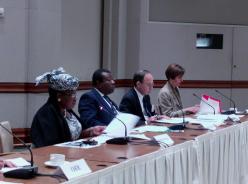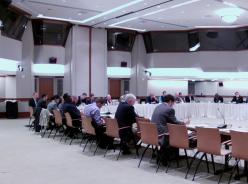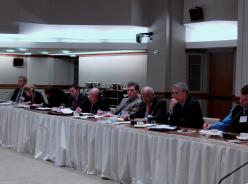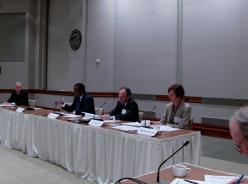On October 29, 2010, the Bretton Woods Committee hosted a program on Africa's Needs and the Evolving Role of Development Aid in Washington, DC. James C. Orr, Executive Director of the Bretton Woods Committee, moderated discussions among the panel of speakers: Dr. Ngozi Okonjo-Iweala, Managing Director, the World Bank; Dr. Toga McIntosh, Executive Director, the World Bank; Daniel Zavala, Managing Director, DAI Capital Management; and Deborah Brautigam, Professor, School of International Service, American University. The program explored the key constraints to economic growth in sub-Saharan Africa, how to make development aid more effective, and the role of the private sector in the development process.


Investment Opportunities. The panelists drew attention to the wealth of opportunities that Africa presents to the rest of the world. Okonjo-Iweala noted that before the global economic crisis, Africa was growing at an unprecedented rate. During the recovery period, on the other hand, Africa quickly returned to rapid growth, keeping pace with Latin America. She noted that with an internal market of over one billion people, Africa was becoming an important source of growth in the new multipolar world economy. Zavala highlighted that there was great investor interest in Africa, but that knowledge about the investment environment was often lacking and advisory assistance for companies was needed. Brautigam explained that the Chinese were already taking advantage of these investment opportunities by moving production into Africa in order to produce for growing local markets.

Capacity Building and Country-led Development. Okonjo-Iweala explained that development can be more effective if it is led by the sub-Saharan African countries themselves and not by external partners. She highlighted that countries that develop their own reform plans and identify their own priorities tend to be more motivated and thus more likely to succeed. McIntosh also argued that building capacity and understanding are crucial for sub-Saharan African governments to gain greater respect from the development community and to gain leverage in setting the agenda when negotiating with development partners.

Okonjo-Iweala proposed the creation of a development bond, backed by donor resources that would help raise the large amounts of money needed to help countries overcome key constraints such as infrastructure building and spur private sector growth. She also called for development funds to be used as financial guarantees to create more public/private partnerships and to leverage private investment resources. McIntosh noted the key role of the private sector in development and the need for the private sector to work with governments and aid donors in harmonizing economic, social, and political development priorities.
Zavala explained that aid should be used to strengthen the private sector because private sector activity is necessary to sustain the development process going forward. He emphasized that such strengthening should be a goal of development aid because private sector growth leads to job creation, which benefits the entire country.
Brautigam observed that the region contained many resources and much potential, but that the aid community needs to find a more effective way to link development with these riches. She explained that the Chinese experience may be relevant in this context. Among others, Chinese interests are using methods such as commodity-backed infrastructure projects, performance-based public/private cooperation, and joint ventures, when investing in sub-Saharan Africa. While not considered aid per se, they nonetheless are spurring the growth of the private sector and pushing development in Africa forward.
